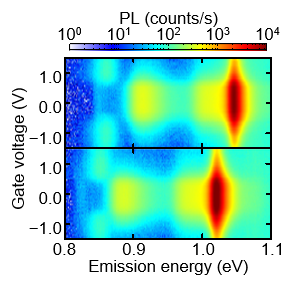Research:Molecular screening effects on exciton-carrier interactions in suspended carbon nanotubes
The Coulomb interactions are enhanced in carbon nanotubes because of the limited screening in one-dimensional systems, and the emission energies are therefore sensitive to the dielectric environment. Even for the least screened air-suspended nanotubes, the excitons are known to be affected by adsorbed molecules. Here we investigate the molecular screening effects on exciton-carrier interactions in suspended CNTs within field-effect transistor structures.
The molecular screening effects can be studied by comparing the photoluminescence spectra right after growth by chemical vapor deposition and after molecular adsorption. The figure below shows gate-voltage dependence of photoluminescence for a nanotube in a pristine state (top) and an adsorbed state (bottom).

From the photoluminescence data, one can see that all emission peaks redshift upon molecular adsorption. In particular, the energy difference between the bright exciton peak and the trion peak becomes smaller, indicating a reduction in the trion binding energy.
Furthermore, there is a subtle change in the gate voltage region for which the photoluminescence intensity stays roughly constant. The width of the constant instensity region is slightly narrower for the adsorbed state, suggesting the bandgap energy has changed.
To learn more about this work, please refer to:
Molecular screening effects on exciton-carrier interactions in suspended carbon nanotubes
Appl. Phys. Lett.
113, 121105 (2018).
![]()